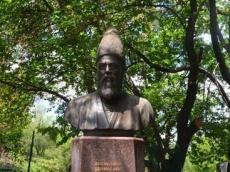|
|
TODAY.AZ / Arts & Entertainment
Azerbaijan does homage to Mirza Shafi Vazeh
07 February 2014 [15:25] - TODAY.AZ
 By AzerNews
By AzerNewsThe 220th birthday anniversary of the prominent poet and enlightener Mirza Shafi Vazeh will be celebrated in Azerbaijan.
President Ilham Aliyev signed a decree to instruct the Ministry of Culture and Tourism, to develop and implement an action plan in cooperation with the National Academy of Sciences and the Executive Power of Ganja.
Poetry of Mirza Shafi Vazeh became famous beyond Azerbaijan in 19th century. Vazeh continued a tradition of oriental poetry chanting high humanity and spiritual beauty in his works. His poems small in content contain many aphorisms, in which the poet presented his life philosophy.
His heritage occupies an important place in the development of literary and cultural relations between Azerbaijan and Europe.
Vazeh's poems were translated into almost all European languages in the middle of the nineteen century. Thus, he became more popular in Europe than in his homeland.
Mirza Shafi was born in Ganja, home for many Azerbaijani talented poets, and studied literature there. He was fascinated with Sufism. Mirza Shafi gave calligraphy lessons in Ganja. One of his students was Mirza Fatali Akhundov, another great mind writer, farther of Azerbaijani theater.
Akhundov later wrote that Mirza Shafi opened his eyes, filled with disgust to the clergy, and introduced him all the issues of true education. In Ganja Mirza Shafi wrote poetry - ghazal and rubais - full of love.
Afterwards, he moved to Tiflis and started teaching. Here he was acquainted with many Azerbaijani, Russian and Georgian writers and educators. Tiflis changed future of Mirza Shahi's heritage, when he met Friedrich von Bodenstedt, German orientalist, who translated Vazeh's poetry and presented in Europe.
He was also Vazeh's student, studying languages and writing Vazeh's poetry in the most fruitful period of the poet's life. On the other hand, Mirza Shafi himself became acquainted with European literature through his European students.
When returning home Bodenstedt had taken his master's recordings of the songs and a book of poems entitled "The Key of Wisdom", which contained the whole world outlook of Vazeh. German scientist published a translated version of Vazeh's poetry, which became an extraordinary success.
"In his book "A thousand and one day in the East", most part of which is devoted to Mirza Shafi and translation of his poems," Bodenstedt recalls, that after the lessons an assembly "divan" had started, where Mirza Shafi was singing and explained to his song. The book was reprinted several times and was translated into many European languages?.?
The unprecedented success infatuate Bodenstedt, who after Vazeh's death, declared himself an author of all the poems he published before, and Europe believed him.
However, original poetry of Mirza Shafi in Azerbaijani and Persian languages was found later, proving the authorship of wise poet Vazeh.
The most part of his poetry is satirical, freedom-loving songs. Educational character of his creativity is primarily associated with the philosophy of the poet, who rejected the religious fanaticism, Oriental despotism, old customs and prejudices, as well as all other obstacles to personal freedom, addressing his poetry to the lower classes, and intellectuals.
URL: http://www.today.az/news/entertainment/130711.html
 Print version
Print version
Views: 2606
Connect with us. Get latest news and updates.
See Also
- 19 December 2025 [13:12]
History Museum holds presentation of Iravan Fortress City's ethnographic map - 19 December 2025 [11:51]
Philharmonic Hall holds concert dedicated to prominent statesmen - 19 December 2025 [10:43]
Exhibition 'Color of Voice' opens at National Art Museum - 18 December 2025 [14:53]
Culture Ministry listed among winners of MilliNet 2025 competition - 18 December 2025 [13:33]
Opera 'Nasimi' to be presented in new AI-Powered stage production - 18 December 2025 [12:56]
Live-Show: Czechia through eyes of Azerbaijani artists - 17 December 2025 [13:11]
Culture Ministry, UNAOC explore new opportunities for cooperation - 17 December 2025 [11:56]
Master classes on tar and piano held in Mingachevir - 16 December 2025 [12:48]
Anthology 'Classic Czech Short Stories' in Azerbaijani presented in Prague - 16 December 2025 [12:27]
Azerbaijani tenor shines at London’s Royal Opera House
Most Popular
 Silence on the border: why is it unprofitable for Narek Karapetyan?
Silence on the border: why is it unprofitable for Narek Karapetyan?
 President Ilham Aliyev addresses participants of int'l scientific-practical congress on 90th anniversary of Advanced Training Institute for Doctors
President Ilham Aliyev addresses participants of int'l scientific-practical congress on 90th anniversary of Advanced Training Institute for Doctors
 France’s turn to private armies risks tearing Western alliance apart
France’s turn to private armies risks tearing Western alliance apart
 ADA University’s School of Design and Architecture contributes to urban planning and design discussions
ADA University’s School of Design and Architecture contributes to urban planning and design discussions
 Russian PM Mikhail Mishustin sends congratulatory letter to President Ilham Aliyev
Russian PM Mikhail Mishustin sends congratulatory letter to President Ilham Aliyev
 President of Turkmenistan sends congratulatory letter to President Ilham Aliyev
President of Turkmenistan sends congratulatory letter to President Ilham Aliyev
 Ice and Snow Tourism Expo opens in China
Ice and Snow Tourism Expo opens in China
